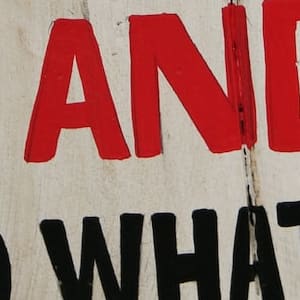thin end of the wedge: Idiom Meaning and Origin
What does ‘thin end of the wedge’ mean?
The idiom "thin end of the wedge" refers to a small, seemingly insignificant action or event that can lead to more significant and undesirable consequences in the future. It symbolizes the start of a negative or unwanted situation that may escalate over time.

Idiom Explorer
The idiom "vanish into thin air" means to completely disappear or vanish without a trace, as if one has evaporated into nothingness.
The idiom "turn the tide" means to change the course or direction of a situation, typically in a positive way, especially when it seemed to be going against someone or something.
The idiom "turn the scale" means to tip the balance or create a decisive change in a situation, typically in someone's favor.
The idiom "turn of events" refers to an unexpected change or shift in a situation or sequence of events.
The idiom "Trojan-horse" is used to describe a deceptive tactic or strategy where something appears harmless or beneficial at first, but actually has deceitful or harmful intentions or consequences.
The idiom "tip the scales" means to have a decisive or significant influence on a situation or outcome, often by providing an advantage or causing a change in balance.
The idiom "tip the scale" means to have a decisive influence or to cause a significant change in a situation or outcome. It suggests the idea of adding weight to one side of a balance scale, disrupting the equilibrium.
The idiom "thumb on the scale" means to unfairly influence a situation or outcome in one's favor by cheating or manipulating the circumstances.
An idiom meaning to disrupt or interfere with a process, plan, or situation, usually causing it to go off track or fail.
Understanding the Danger Zone
The idiom "thin end of the wedge" is commonly used in English to represent the idea that a small or seemingly inconsequential action could lead to larger and potentially negative consequences in the future. This phrase suggests that by tolerating or accepting a minor issue, we may inadvertently open the door to bigger problems or undesirable outcomes. The term "thin end of the wedge" comes from the concept of a wedge, a tool with a triangle-shaped end that can be inserted into a narrow space to create a separation or split.
One possible origin of this idiom can be traced back to Ancient Rome, where it is believed to have come from the Latin phrase "cuneus infimi generis," meaning the "wedge of the lowest kind." This phrase referred to individuals of lower social status or foreigners who were initially tolerated but could eventually cause division and disruption within society if accepted.
This idiom gained popularity and entered the English language in the early 19th century. It is speculated that its usage at that time was influenced by the rise of industrialization and the growing recognition of the potential consequences of small actions in various aspects of life. People began using the phrase in political and social contexts to express concerns about the introduction of seemingly insignificant changes that could lead to larger and more significant disruptions.
The idiom "thin end of the wedge" is still widely used today in different domains, including politics, economics, social issues, and personal relationships. It serves as a warning against the possible negative outcomes of seemingly harmless actions or decisions. This phrase reminds us to carefully consider the implications of even the smallest steps or compromises.
In politics, for example, this idiomatic expression may caution against accepting small changes in policies or laws that could eventually erode fundamental rights or values. Similarly, in the economic sphere, it draws attention to the potential dangers of allowing minor breaches of ethical conduct that might lead to more significant breaches in the future.
On a personal level, the idiom "thin end of the wedge" acts as a reminder to individuals about the importance of setting boundaries and recognizing the potential consequences of small compromises in relationships or personal behavior. It encourages people to think about the long-term effects of their actions and decisions.
Related idioms that convey a similar concept include "short end of the stick," "on thin ice," and "the straw that broke the camel's back."
"Short end of the stick" refers to being at a disadvantage or receiving the worst part of a situation. This phrase conveys the idea that someone is not getting their fair share or is being treated unfairly. It aligns with the concept of the "thin end of the wedge" as both idioms allude to negative consequences or outcomes resulting from an unfavorable situation.
"On thin ice" is another idiom that relates to the potential negative consequences of actions. It suggests that someone is in a precarious or risky position, where any misstep could lead to negative outcomes. The phrase "on thin ice" shares similarities with the "thin end of the wedge" in the sense that both warn against the possible repercussions of seemingly harmless or insignificant actions.
"The straw that broke the camel's back" refers to a seemingly minor or trivial event that triggers a larger, more significant problem. This idiom implies that a series of small issues can eventually culminate in a major consequence or breakdown. "The straw that broke the camel's back" aligns with the concept of the "thin end of the wedge," as both emphasize the potential negative outcomes resulting from initially insignificant actions or events.
While the idiom "thin end of the wedge" may vary slightly in usage across different contexts and regions, variations such as "thin end of the wedge" or "thin edge of the wedge" maintain the same essential meaning and metaphorical concept.
The idiom "thin end of the wedge" serves as a cautionary reminder to carefully consider the implications of choices and decisions, both in personal and larger societal contexts. By acknowledging the power of the metaphorical wedge, individuals can become more aware of the potential ramifications of their actions, leading to more thoughtful and informed decision-making.
Example usage
Examples of how the idiom "thin end of the wedge" can be used in a sentence:
- Allowing students to use their phones during class may be the thin end of the wedge when it comes to maintaining discipline.
- Increasing the price of cigarettes is just the thin end of the wedge in the government's plan to reduce smoking rates.
- Ignoring small instances of workplace harassment can be the thin end of the wedge that leads to a toxic work environment.
More "Metaphorical" idioms



